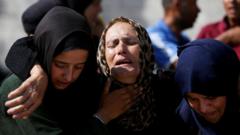As Iran embarks on its journey with BRICS, it confronts both opportunities and divisions within the alliance regarding its international positioning.
**Iran's BRICS Membership: A Bid for Global Support Amidst Isolation**

**Iran's BRICS Membership: A Bid for Global Support Amidst Isolation**
Iran seeks new alliances with BRICS nations in response to military tensions, testing international solidarity.
In the wake of significant military actions against it, Iran finds itself increasingly isolated in the Middle East but is looking to mend that through participation in the BRICS summit in Rio de Janeiro. Starting this Sunday, the discussions will encompass not only economic partnerships and dialogue but also strategic positioning as Iran grapples with threats posed by the United States and Israel concerning its nuclear program.
The BRICS coalition, consisting of Brazil, Russia, India, China, South Africa, and others, comes as a potential lifeline for Iran, giving it a platform to assert the backing of prominent nations amidst ongoing sanctions. Notably, following recent military strikes on Iran by Israel and the U.S., BRICS issued a statement indicating its “grave concern” over these actions, characterizing them as violations of international law and the United Nations Charter. However, the response lacked explicit condemnation of the two Western powers, revealing cracks within the alliance regarding the extent to which it should support or oppose Iran.
Experts indicate that there is little consensus among BRICS members about Iran's situation. According to Oliver Stuenkel, a specialist on BRICS from the Getúlio Vargas Foundation in Brazil, the alliance opted for an “inoffensive position” regarding Iran's challenges. This cautious stance illustrates the complex dynamics within BRICS, as member countries hold varying views on military interventions and international relations.
Some analysts suggest that Iran's participation in BRICS could yield strategic diplomatic advantages, yet the differences among member countries can undermine a unified response. With some members more aligned with Western interests, the future of BRICS as a counterbalance to U.S. and allied power may be critically tested by how it navigates tensions involving Iran, a member still seeking to establish its role on the world stage. The forthcoming discussions could mark a pivotal moment for Iran as it attempts to solidify its partnerships while coping with widespread isolation.
The BRICS coalition, consisting of Brazil, Russia, India, China, South Africa, and others, comes as a potential lifeline for Iran, giving it a platform to assert the backing of prominent nations amidst ongoing sanctions. Notably, following recent military strikes on Iran by Israel and the U.S., BRICS issued a statement indicating its “grave concern” over these actions, characterizing them as violations of international law and the United Nations Charter. However, the response lacked explicit condemnation of the two Western powers, revealing cracks within the alliance regarding the extent to which it should support or oppose Iran.
Experts indicate that there is little consensus among BRICS members about Iran's situation. According to Oliver Stuenkel, a specialist on BRICS from the Getúlio Vargas Foundation in Brazil, the alliance opted for an “inoffensive position” regarding Iran's challenges. This cautious stance illustrates the complex dynamics within BRICS, as member countries hold varying views on military interventions and international relations.
Some analysts suggest that Iran's participation in BRICS could yield strategic diplomatic advantages, yet the differences among member countries can undermine a unified response. With some members more aligned with Western interests, the future of BRICS as a counterbalance to U.S. and allied power may be critically tested by how it navigates tensions involving Iran, a member still seeking to establish its role on the world stage. The forthcoming discussions could mark a pivotal moment for Iran as it attempts to solidify its partnerships while coping with widespread isolation.



















